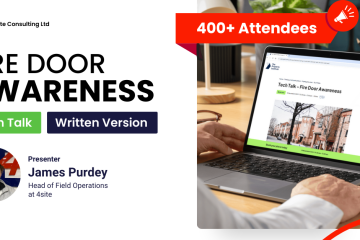As part of the Building Safety Act 2022, the Principal Accountable Person for a “higher risk building” must produce and maintain a Resident Engagement Strategy.
Applying to all residential buildings over 18 meters or 7 storeys in height and that contain two or more residential dwellings, this section of the Act aims to ensure that residents are taking an active role in the health and safety management of their blocks.
Here we’ll be discussing how to put your strategy together; from deciding on means of communication to ensuring your strategy is inclusive and suited to the needs of your block.
Why is Resident Engagement So Important?
Your residents are the eyes and ears of your building. Not only should their voices be heard during decision-making, but they are best-positioned to alert you to any maintenance issues that could cause problems. They will be the first to let you know if a fire door isn’t closing or if an extinguisher has gone missing- if the right channels exist for them to do so and they feel genuinely heard.
They are also huge stakeholders in the health and safety management of the building. Their main investment, all of their belongings, their sense of home and safety are all tied up in the correct management of their unit and the building as a whole.
Having had a part in any decision-making, they are far more likely to be engaged in the policies or maintenance plans put forward- reducing the likelihood of complaints. They’re also more likely to retain health and safety advice such as the correct fire drill procedure; reducing the chances of injuries and deaths in such an event.
Effective communication to ensure building safety may also have a very positive effect in general. Starting the conversation can breed a sense of community within the block, which is helpful on so many levels. Harmonious blocks lead to fewer complaints, better dispute resolution and lower attrition. Not to mention happier residents and a better quality of life.
The Legal Requirements
You can read all about the requirements of your resident engagement strategy here, but as a rundown of the key points you must cover, you must include:
- The information you will be providing to your residents and owners
- What you will be asking residents about
- How you will collect and use the opinions received
- How you will measure and review participation
Once it is completed, you must provide the written strategy to all Accountable Persons. They must then distribute the document to all residents over the age of 16, as well as the owners of the units. It can be distributed as an email or as physical copies depending on the needs of your residents.
You must then offer at least 3 weeks of consultation on the strategy and the opinions received should be considered and applied to the strategy if necessary. You should make it as easy as possible for residents to voice their opinions on the strategy- several options are discussed below.
Reviews of your strategy are then needed:
- Every 2 years
- After every consultation of the strategy
- After a mandatory occurrence report
- After the completion of significant material alterations to the building
Building Great Communication
Great communication relies on creating effective channels for the different demographics within your block, as well as taking language barriers and accessibility into account.
For best effect, several channels should be made available. These could include:
- Online social media groups
- A dedicated phone line
- A dedicated email address
- Group messaging services
- A bespoke app
- Newsletters
- A building website
- Resident meetings
- Notice boards
- A suggestion box
- Surveys
Younger residents may prefer the online options, older generations may prefer to call. Those with busy lifestyles may prefer to email and those who like to speak face to face will attend the meetings. Offering a mixture gives you the best chance of capturing a large portion of your residents’ opinions.
Your strategy should cater for the languages spoken by the residents of your block wherever possible. This could mean surveying your residents to find out how many are non-English speakers and to narrow down what languages they do use. Translated versions of any notices can then be provided and translation services can be utilised for any meetings.
In terms of accessibility for disabled or non-readers, alternative formats should be provided. This could include audio recordings of key information or large print versions of written communication. Special care should be taken to ensure any disabled residents are able to attend in-person events.
How 4site Consulting Can Help
We understand the pressures faced by property managers, and we are aware that the new requirements may be adding an extra layer of overwhelm for our clients. Please feel free to pick up the phone or drop us a message any time.
Our team are ready and waiting to support you with all aspects of your Resident Engagement Strategies and Building Safety Cases.


